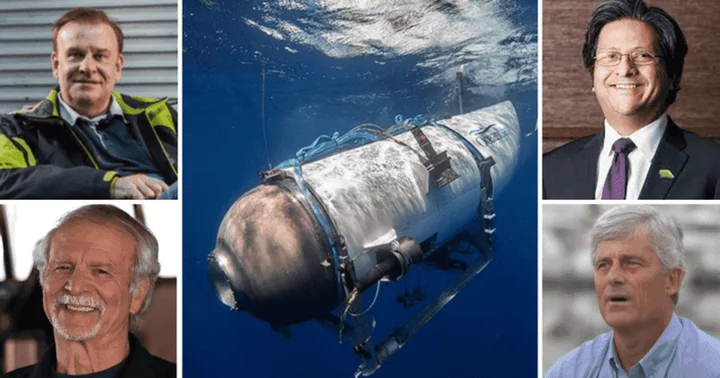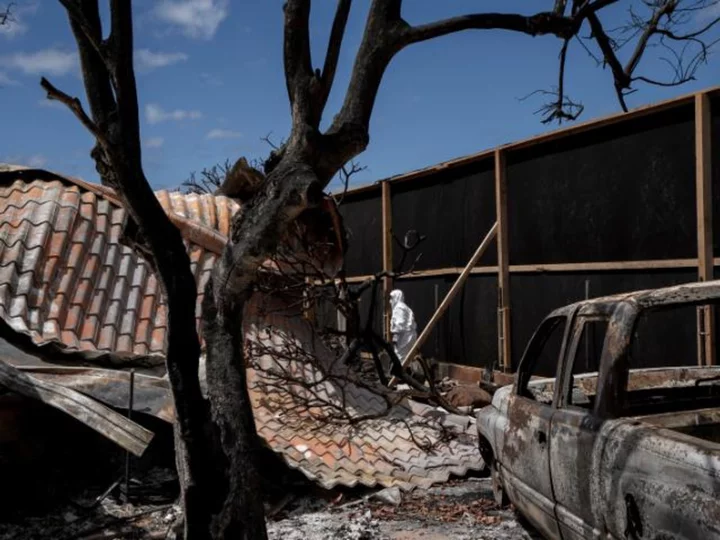BOSTON, MASSACHUSETTS: The Coast Guard and rescuers are currently running a race against time to locate the missing boat-like submarine, which disappeared on a dive to see the wreck of the Titanic. The submersible named Titan, owned by OceanGate Expeditions, was taking a team of five people to view the famous wreck when it went missing off the North American coast in the Atlantic on Monday, June 19.
The titanium-made submersible, which weighs almost the same as six mid-sized cars, was launched around 4 am on Sunday, June 18, but lost communication with the sub's mothership MV Polar Prince, an hour and 45 minutes into the two-hour descent. The five-member crew on board the Titan includes British billionaire Hamish Harding, French explorer Paul-Henri Nargeolet, OceanGate CEO Stockton Rush, Pakistan millionaire Shahzada Dawood and his son Suleman. Now, it is estimated that the five missing passengers have just 24 hours of oxygen supply left inside the vessel.
The desperate search for the Titan
In desperate efforts to locate the Titan, the US Coast Guard has launched an extensive search operation with the Canadian Coast Guard, the US Navy, and the Canadian armed forces. Capt Jamie Frederick, from the US Coast Guard, says crews from the US and Canada "are working round the clock" during the "complex search effort". Two US Lockheed C-130 Hercules aircraft are currently conducting overflights to assist in the search operations in the remote area of the ocean. Rescuers are also using three C-17s from US Air Mobility Command to move another commercial company’s submersible and support equipment from Buffalo, New York, to St John’s to aid in the search.
More vessels and aircraft, including Royal Canadian Navy ship HMCS Glace Bay and Canadian Coast Guard Ship, are also on their way to assist in the search for the missing submersible. An Oceangate advisor, David Concannon, who had planned to be a part of the expedition, also revealed that officials are planning to send a remotely operated vehicle (ROV) that could descend to a depth of 20,000ft to the location. Meanwhile, Canadian P-3 Aurora aircraft are conducting sonar searches while sonar buoys, which can hear at depths of up to 13,000ft, are also being deployed in the area.
Why rescuing the Titanic sub is so difficult
As the extensive search continues, many experts have asserted numerous difficulties that the rescuers can face while locating the missing Titan. Jamie Pringle, a reader in forensic geosciences at Keele University in England, told Forbes that underwater searches are "pretty tricky" since oceans are difficult areas to search due to its "different stratified levels," currents, and the ocean floor being much more "rugged than on land." Meanwhile, Eric Fusil, an associate professor at the University of Adelaide in Australia, noted that communication is another major challenge that rescuers will face during the search.
He stated that the rescue teams have “no radar, no GPS” and no spotlight or laser beams beyond “a few meters.” However, there were also some experts who claimed that while finding Titan is hard, rescuing it from the ocean floor could be even harder due to the lack of vessels that can get close to the Titanic wreck, which lies 12,500ft beneath the surface of the Atlantic Ocean. Alistair Greig, a marine science professor at University College London, told The BBC that “while the submersible might still be intact if it is deeper than more than 200m (656ft) there are very few vessels that can get that deep, and certainly not divers.”
'Pretty tough environment'
Greig continued by noting that vehicles designed for Navy submarine rescue “certainly can’t get down to anywhere near the depth of the Titanic.” Another Marine professor, Stefan B Williams, told The Insider that it may be difficult for the rescue team to even spot the submersible ship from the seabed, as its sonars wouldn't be able to pick it out from the debris and uneven terrain on the seabed. The professor further stated that whatever the reasons behind the Titan's disappearance, it is certain that if the ship is still in the piece and its occupants are still alive, they are fighting for survival in a "pretty tough environment."









